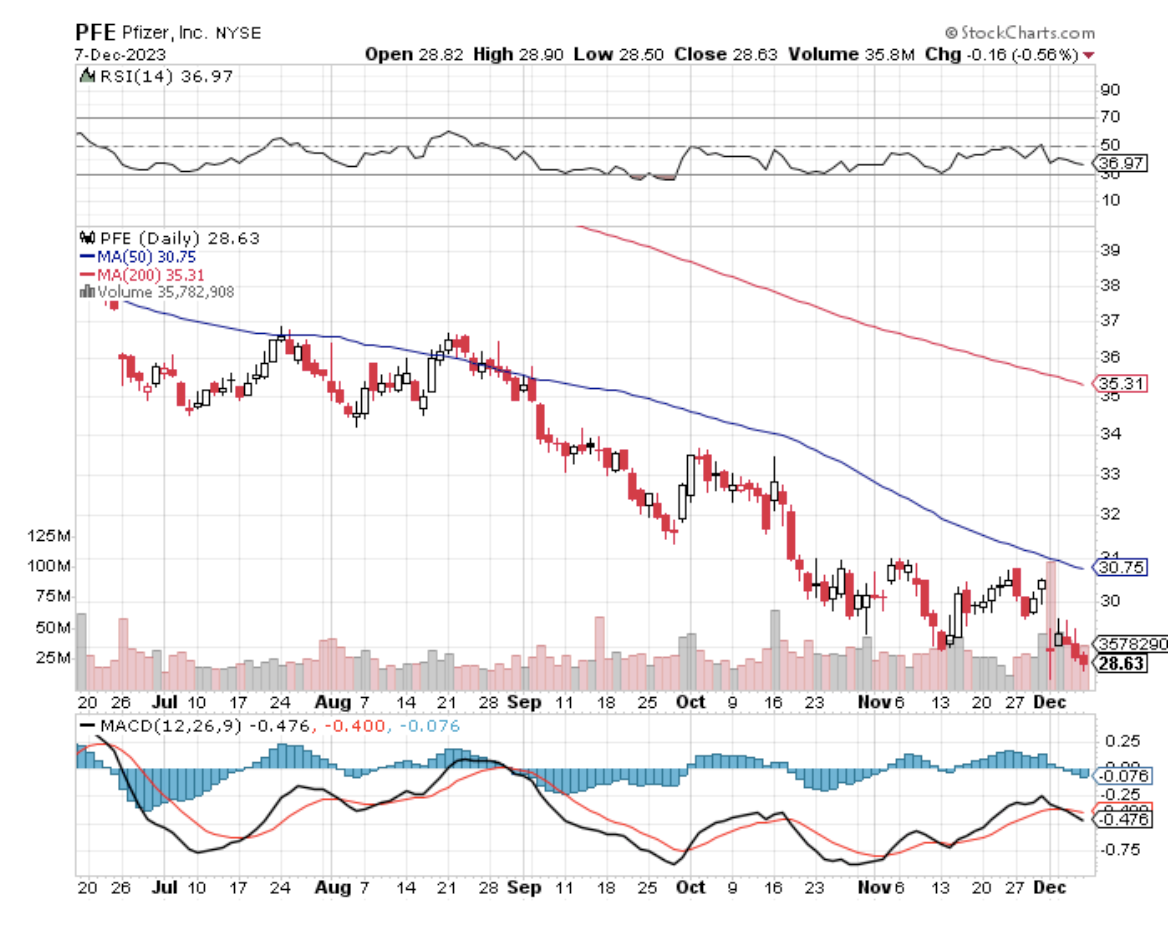A Rebounding Blue Chip
In the maelstrom of 2023, Pfizer (PFE) found itself navigating through a tempest, much to the dismay of shareholders. The aftermath? A harrowing -40% total return loss, leaving shareholders reeling.
This downturn followed Pfizer's COVID-19 vaccine triumph, a success story that lost its sheen as global government demand for the vaccine and Paxlovid antiviral dwindled.
Looking back, Pfizer's narrative in 2023 could rival a Shakespearean tragedy. The demand dip for its COVID arsenal was just the beginning; a cascade of other factors compounded the company's misfortunes.
Take, for instance, the controversial $43 billion acquisition of Seagen (SGEN) in March. While this move aimed for cancer treatment breakthroughs, it was widely seen as a Hail Mary, signaling gaps in Pfizer's drug pipeline.
I estimate this strategy might have slashed shareholder value by at least 10%, given the immediate financial aftermath of the merger.
Then, adding to the woes, Pfizer's Nash County production facility in North Carolina faced devastation by a tornado in July.
It seemed as though, for Pfizer in 2023, trouble came not just in droves but in torrents.
The final blow? The discontinuation of the twice-daily dose development for Danuglipron, Pfizer's weight-loss drug candidate.
This decision casts a shadow over the prospects of its once-a-day dosage, still in trials, and simultaneously cracks open the door for other biotech players in the oral weight-loss drug arena.
Meanwhile, the company also aimed to join the race for obesity treatment innovation. In this arena, injectable weight-loss drugs from Eli Lilly (LLY) and Novo Nordisk (NVO) have set the stage, and now, the demand for oral solutions is burgeoning.
Pfizer once pegged this market's potential at an eye-watering $90 billion a year — a target that has not gone unnoticed by keen biotechs.
Yet, with Pfizer stepping back from its Danuglipron project due to adverse side effects, it finds itself trailing in this race. In comparison, Lilly and Novo are forging ahead with their products, turning Pfizer's stumble into a potential windfall for other biotech firms.
Notably, the biotech sector is witnessing a flurry of activity in response to Pfizer’s failed attempt.
Firms like Viking Therapeutics (VKTX), Terns Pharmaceuticals (TERN), Structure Therapeutics (GPCR), and Altimmune (ALT) have seen their share prices soar following their own positive trial results or strategic announcements.
The diverse approaches these biotechs are employing in their anti-obesity drug development have piqued investors’ interest.
In effect, speculation is rife about which one might emerge as a desirable acquisition target for Pfizer — and this speculation isn't without basis.
I previously shared that Roche Holding (RHHBY) recently acquired Carmot Therapeutics for $2.7 billion, and AstraZeneca (AZN) entered a licensing agreement with Eccogene.
With a history of significant acquisitions, Pfizer might well consider a similar path to address its challenges in the weight-loss pill sector.
Pfizer's journey through 2023 was a series of unfortunate events, to say the least. As we look to the future, questions about potential challenges in 2024 loom.
While major acquisitions seem unlikely in the wake of the Seagen deal, shareholder sentiment is fragile. The immediate risks for Pfizer include the possibility of a 2024 recession impacting sales and a generally bearish stock market, potentially keeping share prices around the $30 mark.
Historically, however, Pfizer has stood as a bastion of strength during recessions and bear markets.
Looking longer term, the specter of Medicare drug price negotiations looms large, threatening to dampen growth investor sentiment.
This challenge isn't unique to Pfizer; it's a cloud hovering over all of Big Pharma.
Yet, despite these formidable challenges, there's a sense that Pfizer's tumultuous 2023 journey might be approaching a pivotal turning point. Investor sentiment is at a nadir, marred by negative press and shareholder dissatisfaction, painting Pfizer as a stock currently out of favor.
As we look ahead into 2024, a cautious optimism emerges. Should Pfizer return to operational normalcy and continue to reduce its reliance on COVID-related sales — now a smaller part of its business — the company could reassert itself as a prime value and dividend player in the Big Pharma space.
For the resilient investor willing to delve into a bruised yet potentially rebounding blue-chip, Pfizer merits a closer examination. After a year where Murphy's Law seemed the only law, Pfizer stands as a beacon of resilience and a potential phoenix in the biotech and healthcare sector.


